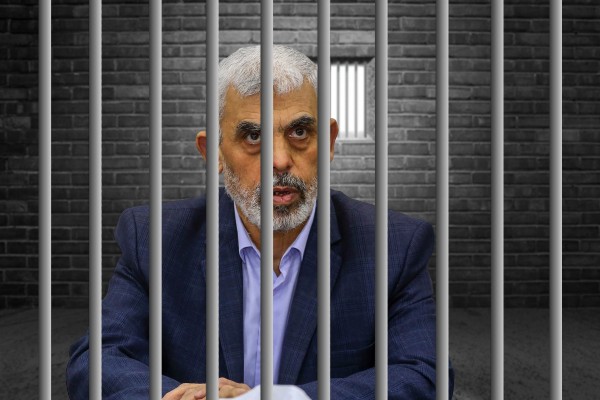“Today when I see his bluster in Gaza, I ask myself how this chicken became a hero,” said the warden of the prison where Hamas boss Yahye Sinwar was jailed in 2002.
By Pesach Benson, United With Israel
To Palestinians, Yahye Sinwar is a fearless hero of “resistance” against Israel. But one Israeli who saw a different side of the man who is now Hamas’ leader of Gaza says Sinwar is nothing more than a “coward.”
Betty Lahat, the first Israeli woman to command a men’s prison, was warden of the HaSharon Prison where Sinwar was jailed in 2002.
She shared her unflattering recollections of Sinwar in an interview with the Maariv newspaper.
Sinwar, now 59, was convicted in 1989 of abducting and murdering two IDF soldiers and four Palestinians he suspected of collaborating with Israel and sentenced to four life terms. After serving 22 years of his sentence, however, he became the most senior of 1,027 Palestinian prisoners released in the 2011 Gilad Shalit prisoner swap.
Lahat — who also headed the Israel Prison Service’s Intelligence Department — described Sinwar as “adversarial and cruel,” and also a “coward.”
“Before his arrest he led by fear and terror. He’d dig holes, throw in people he suspected were against him and pour cement on them while they still lived. In prison he also sent out people to hurt those he didn’t like. But he himself never got his hands dirty,” Lahat said.
Lahat recalled Sinwar frequently stirring up trouble in the prison and letting others take the fall.
“He would send prisoners to stab guards and rile things up, but always behind the scenes. He’d take some sucker, tell him ‘Go stab a jailer’ and then say of him ‘The man’s crazy, he has nothing to lose,'” Lahat said.
“He never stood up and took responsibility or led the prisoners. On the contrary. When there were investigations after incidents he organized, he’d tremble with fear. Hide behind others.”
Lahat added, “Today when I see his bluster in Gaza, I ask myself how this chicken became a hero.”
“The man just fell apart,” Lahat said when discussing his bout with a cancerous tumor in his brain. “I came to see him after the surgery. I told him, ‘You see, in the end, the State of Israel that you’re so against saved your life.’ The guy started crying. Really crying and begging me to tell him he’d come out of it and that he wouldn’t die.”
‘Most Prisoners Didn’t Like Sinwar’
As one of the longer-serving prisoners, Sinwar had certain status which enabled to him to lead informal prisoner “committees” which monitored the trustworthiness of fellow prisoners.
According to Lahat, the other prisoners feared Sinwar’s influence.
“Most prisoners didn’t like Sinwar, because he used them and they knew he looked out mostly of himself, but they were afraid of his cruelty and respected his status,” she said.
But Lahat also stressed Sinwar’s keen intellect.
“He’s a very intelligent person who invested in his intellectual development and in an in-depth understanding of Israeli society,” Lahat recalled. “He appointed teams in prison to listen to all Israeli radio and TV stations, to follow politicians. They’d listen to political analyses and diplomatic assessments.”
Sinwar became Hamas’s chief of Gaza in 2017 when Ismail Haniyeh became the terror organization’s top leader.
In a high-profile and provocative speech at the end of April, Sinwar insisted that Hamas was prepared to attack synagogues around the world to retaliate for what he called “Israeli aggression” against the Al Aqsa Mosque.
